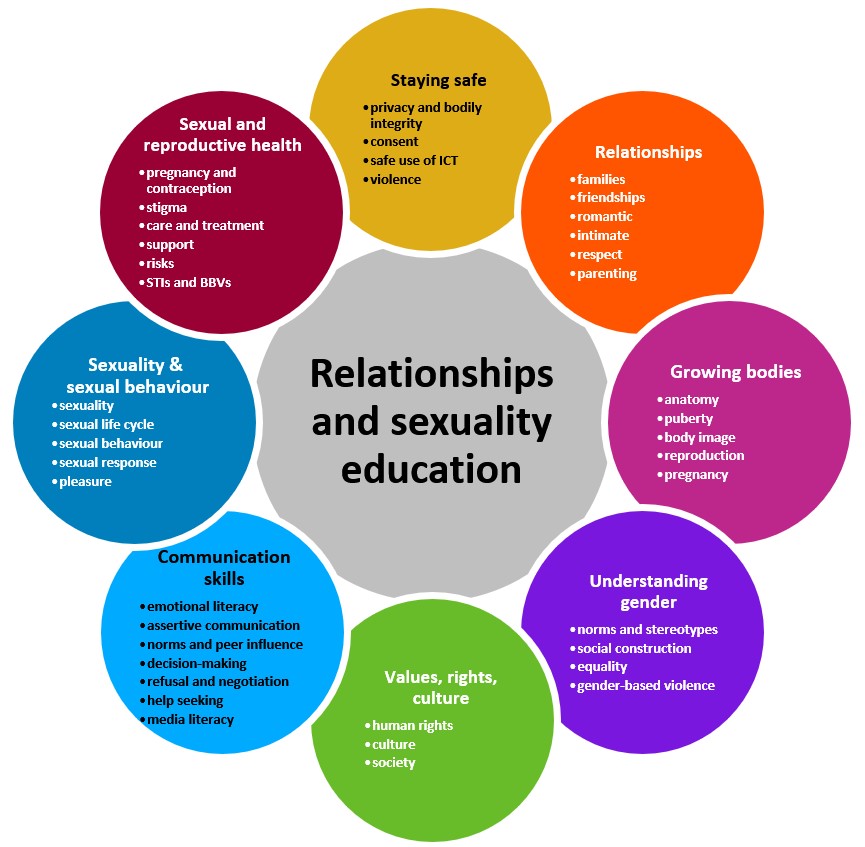
Key messages
- GDHR offers evidence-informed resources to support schools to deliver a comprehensive RSE program with key concepts aligned to the WA Curriculum and 'International Technical Guidance on Sexuality Education'.
- RSE is more than just puberty and sex, it covers age and stage appropriate topics from birth to adulthood including topics like treating other people with respect, consent and how external factors influence people's sexuality.
RSE is far more than just puberty and sex. The term 'sexuality' is often oversimplified to mean 'sexual orientation', but it is far more than that. It is a core dimension of being human which includes: emotional attachment; all kinds of relationships (friendships, family, intimate); closeness; love; personal values; understanding the human body; feelings you have about your body; gender; reproduction; growing up; puberty; identity; sexual feelings and expression.1 Fundamentally, it is about caring for yourself, your body and others.
Evidence informed
The relationships and sexuality education framework for Growing and Developing Healthy Relationships (GDHR) is based on the World Health Organisation's definitions of sexuality, sexual health and sexual rights and the International Technical Guidance on Sexuality Education.1 2
Relationships and sexuality education framework for GDHR

World health organisation definitions1
Sexuality
"A central aspect of being human throughout life and encompasses sex, gender identities and roles, sexual orientation, eroticism, pleasure, intimacy and reproduction. Sexuality is experienced and expressed in thoughts, fantasies, desires, beliefs, attitudes, values, behaviours, practices, roles and relationships. While sexuality can include all of these dimensions, not all of them are always experienced or expressed. Sexuality is influenced by the interaction of biological, psychological, social, economic, political, cultural, legal, historical, religious and spiritual factors." (WHO, 2006a).
Sexual health
"...a state of physical, emotional, mental and social weel-being in relation to sexuality; it is not merely the absence of disease, dysfunction or infirmity. Sexual health requires a positive and respectful approach to sexuality and sexual relationships, as well as the possibility of having pleasurable and safe sexual experiences, free of coercion, discrimination and violence. For sexual health to attained and maintained, the sexual rights of all persons must be respected, protected and fulfilled." (WHO, 2006a)
Sexual rights
"Sexual rights embrace certain human rights that are already recognised in international and regional human rights documents and other consensus documents and in national laws. Rights critical to the realisation of sexual health include the right to:
- equality and non-discrimination
- be free from torture or to cruel, inhumane or degrading treatment or punishment
- privacy
- the highest attainable standard of health (including sexual health) and social security
- marry and to found a family and enter into marriage with the free and full consent of the intending spouses, and to equality in and at the dissolution of marriage
- decide the number and spacing of one's children
- information, as well as education
- freedom of opinion and expression
- effective remedy for violations of fundamental rights.
The responsible exercise of human rights requires that all persons respect the rights of others." (WHO, 2006a)
Age and stage appropriate
As with everything we teach young people, it is taught at an age and stage appropriate level, and what is taught builds on learnings from previous years. As you will see in the Learning activities and the WA curriculum, in the early years RSE covers the physical body, learning about feelings, building self-worth, how to be a good friend and how to say yes and no. As they get older it moves into puberty, navigating with tricky situations, online safety, building on giving consent, then into what people traditionally think RSE is, pregnancy, STIs, contraception, checking for consent to sexual activities.



